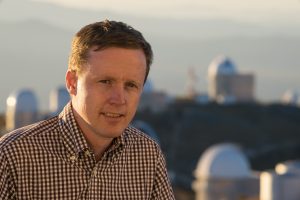Gliese Fellow Markus Kromer joins HITS

In October 2016, Dr. Markus Kromer joined the Physics of Stellar Objects (PSO) research group at HITS as a visiting scientist. Markus obtained the 2016 Gliese Fellowship from the Zentrum für Astronomie der Universität Heidelberg (ZAH). The Gliese Fellowship is awarded to outstanding postdoctoral researchers in any area of astronomy or astrophysics in which ZAH scientists are active and provides the recipients with freedom in their research activities. Being based at the Institute for Theoretical Astrophysics (ITA) of the ZAH and HITS, Markus will investigate the observational display of supernovae explosions.
Markus Kromer studied Physics at the University of Tübingen and received his PhD from the Technical University of Munich in 2009 and later worked at the Max Planck Institute for Astrophysics in Garching and Stockholm University. In 2011, he was awarded the Otto Hahn Medal by the Max Planck Society for the scientific achievements during his PhD. Markus is also a member of the Public ESO Spectroscopic Survey of Transient Objects (PESSTO), a large collaboration of astronomers studying the diversity in the transient Universe.
Markus’ research revolves around the application and further development of computational radiative transfer methods to link astronomical observations and theoretical astrophysical models. He has developed a massively-parallel computer program to simulate the observable display of supernovae explosions.
At the ZAH, Markus will lead research projects to investigate the nature of Type Ia supernovae – an observational subclass of supernovae which are important beacons to measure distances in the Universe. In close collaboration with scientists at HITS, Markus will use his radiative transfer simulations to compare theoretical explosion models from the PSO group with astronomical observations of Type Ia supernovae. Goal of the research collaboration is to shed light on the progenitors and physical mechanisms of supernovae explosions.
About HITS
HITS, the Heidelberg Institute for Theoretical Studies, was established in 2010 by physicist and SAP co-founder Klaus Tschira (1940-2015) and the Klaus Tschira Foundation as a private, non-profit research institute. HITS conducts basic research in the natural, mathematical, and computer sciences. Major research directions include complex simulations across scales, making sense of data, and enabling science via computational research. Application areas range from molecular biology to astrophysics. An essential characteristic of the Institute is interdisciplinarity, implemented in numerous cross-group and cross-disciplinary projects. The base funding of HITS is provided by the Klaus Tschira Foundation.